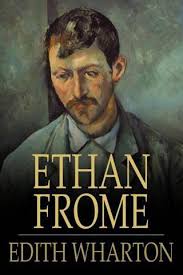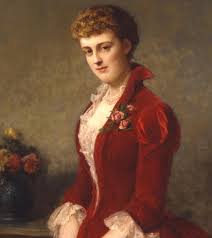Ethan Frome Page #11
Ethan Frome is a 1911 book by American author Edith Wharton. It is set in the fictitious town of Starkfield, Massachusetts. The novel was adapted into a film, Ethan Frome, in 1993.
The sweetness of the picture, and the relief of knowing that his fears of “trouble” with Zeena were unfounded, sent up his spirits with a rush, and he, who was usually so silent, whistled and sang aloud as he drove through the snowy fields. There was in him a slumbering spark of sociability which the long Starkfield winters had not yet extinguished. By nature grave and inarticulate, he admired recklessness and gaiety in others and was warmed to the marrow by friendly human intercourse. At Worcester, though he had the name of keeping to himself and not being much of a hand at a good time, he had secretly gloried in being clapped on the back and hailed as “Old Ethe” or “Old Stiff”; and the cessation of such familiarities had increased the chill of his return to Starkfield. There the silence had deepened about him year by year. Left alone, after his father's accident, to carry the burden of farm and mill, he had had no time for convivial loiterings in the village; and when his mother fell ill the loneliness of the house grew more oppressive than that of the fields. His mother had been a talker in her day, but after her “trouble” the sound of her voice was seldom heard, though she had not lost the power of speech. Sometimes, in the long winter evenings, when in desperation her son asked her why she didn't “say something,” she would lift a finger and answer: “Because I'm listening”; and on stormy nights, when the loud wind was about the house, she would complain, if he spoke to her: “They're talking so out there that I can't hear you.” It was only when she drew toward her last illness, and his cousin Zenobia Pierce came over from the next valley to help him nurse her, that human speech was heard again in the house. After the mortal silence of his long imprisonment Zeena's volubility was music in his ears. He felt that he might have “gone like his mother” if the sound of a new voice had not come to steady him. Zeena seemed to understand his case at a glance. She laughed at him for not knowing the simplest sick-bed duties and told him to “go right along out” and leave her to see to things. The mere fact of obeying her orders, of feeling free to go about his business again and talk with other men, restored his shaken balance and magnified his sense of what he owed her. Her efficiency shamed and dazzled him. She seemed to possess by instinct all the household wisdom that his long apprenticeship had not instilled in him. When the end came it was she who had to tell him to hitch up and go for the undertaker, and she thought it “funny” that he had not settled beforehand who was to have his mother's clothes and the sewing-machine. After the funeral, when he saw her preparing to go away, he was seized with an unreasoning dread of being left alone on the farm; and before he knew what he was doing he had asked her to stay there with him. He had often thought since that it would not have happened if his mother had died in spring instead of winter... When they married it was agreed that, as soon as he could straighten out the difficulties resulting from Mrs. Frome's long illness, they would sell the farm and saw-mill and try their luck in a large town. Ethan's love of nature did not take the form of a taste for agriculture. He had always wanted to be an engineer, and to live in towns, where there were lectures and big libraries and “fellows doing things.” A slight engineering job in Florida, put in his way during his period of study at Worcester, increased his faith in his ability as well as his eagerness to see the world; and he felt sure that, with a “smart” wife like Zeena, it would not be long before he had made himself a place in it. Zeena's native village was slightly larger and nearer to the railway than Starkfield, and she had let her husband see from the first that life on an isolated farm was not what she had expected when she married. But purchasers were slow in coming, and while he waited for them Ethan learned the impossibility of transplanting her. She chose to look down on Starkfield, but she could not have lived in a place which looked down on her. Even Bettsbridge or Shadd's Falls would not have been sufficiently aware of her, and in the greater cities which attracted Ethan she would have suffered a complete loss of identity. And within a year of their marriage she developed the “sickliness” which had since made her notable even in a community rich in pathological instances. When she came to take care of his mother she had seemed to Ethan like the very genius of health, but he soon saw that her skill as a nurse had been acquired by the absorbed observation of her own symptoms. Then she too fell silent. Perhaps it was the inevitable effect of life on the farm, or perhaps, as she sometimes said, it was because Ethan “never listened.” The charge was not wholly unfounded. When she spoke it was only to complain, and to complain of things not in his power to remedy; and to check a tendency to impatient retort he had first formed the habit of not answering her, and finally of thinking of other things while she talked. Of late, however, since he had reasons for observing her more closely, her silence had begun to trouble him. He recalled his mother's growing taciturnity, and wondered if Zeena were also turning “queer.” Women did, he knew. Zeena, who had at her fingers' ends the pathological chart of the whole region, had cited many cases of the kind while she was nursing his mother; and he himself knew of certain lonely farm-houses in the neighbourhood where stricken creatures pined, and of others where sudden tragedy had come of their presence. At times, looking at Zeena's shut face, he felt the chill of such forebodings. At other times her silence seemed deliberately assumed to conceal far-reaching intentions, mysterious conclusions drawn from suspicions and resentments impossible to guess. That supposition was even more disturbing than the other; and it was the one which had come to him the night before, when he had seen her standing in the kitchen door. Now her departure for Bettsbridge had once more eased his mind, and all his thoughts were on the prospect of his evening with Mattie. Only one thing weighed on him, and that was his having told Zeena that he was to receive cash for the lumber. He foresaw so clearly the consequences of this imprudence that with considerable reluctance he decided to ask Andrew Hale for a small advance on his load. When Ethan drove into Hale's yard the builder was just getting out of his sleigh. “Hello, Ethe!” he said. “This comes handy.” Andrew Hale was a ruddy man with a big gray moustache and a stubbly double-chin unconstrained by a collar; but his scrupulously clean shirt was always fastened by a small diamond stud. This display of opulence was misleading, for though he did a fairly good business it was known that his easygoing habits and the demands of his large family frequently kept him what Starkfield called “behind.” He was an old friend of Ethan's family, and his house one of the few to which Zeena occasionally went, drawn there by the fact that Mrs. Hale, in her youth, had done more “doctoring” than any other woman in Starkfield, and was still a recognised authority on symptoms and treatment.
Translation
Translate and read this book in other languages:
Select another language:
- - Select -
- 简体中文 (Chinese - Simplified)
- 繁體中文 (Chinese - Traditional)
- Español (Spanish)
- Esperanto (Esperanto)
- 日本語 (Japanese)
- Português (Portuguese)
- Deutsch (German)
- العربية (Arabic)
- Français (French)
- Русский (Russian)
- ಕನ್ನಡ (Kannada)
- 한국어 (Korean)
- עברית (Hebrew)
- Gaeilge (Irish)
- Українська (Ukrainian)
- اردو (Urdu)
- Magyar (Hungarian)
- मानक हिन्दी (Hindi)
- Indonesia (Indonesian)
- Italiano (Italian)
- தமிழ் (Tamil)
- Türkçe (Turkish)
- తెలుగు (Telugu)
- ภาษาไทย (Thai)
- Tiếng Việt (Vietnamese)
- Čeština (Czech)
- Polski (Polish)
- Bahasa Indonesia (Indonesian)
- Românește (Romanian)
- Nederlands (Dutch)
- Ελληνικά (Greek)
- Latinum (Latin)
- Svenska (Swedish)
- Dansk (Danish)
- Suomi (Finnish)
- فارسی (Persian)
- ייִדיש (Yiddish)
- հայերեն (Armenian)
- Norsk (Norwegian)
- English (English)
Citation
Use the citation below to add this book to your bibliography:
Style:MLAChicagoAPA
"Ethan Frome Books." Literature.com. STANDS4 LLC, 2025. Web. 24 Feb. 2025. <https://www.literature.com/book/ethan_frome_264>.








Discuss this Ethan Frome book with the community:
Report Comment
We're doing our best to make sure our content is useful, accurate and safe.
If by any chance you spot an inappropriate comment while navigating through our website please use this form to let us know, and we'll take care of it shortly.
Attachment
You need to be logged in to favorite.
Log In